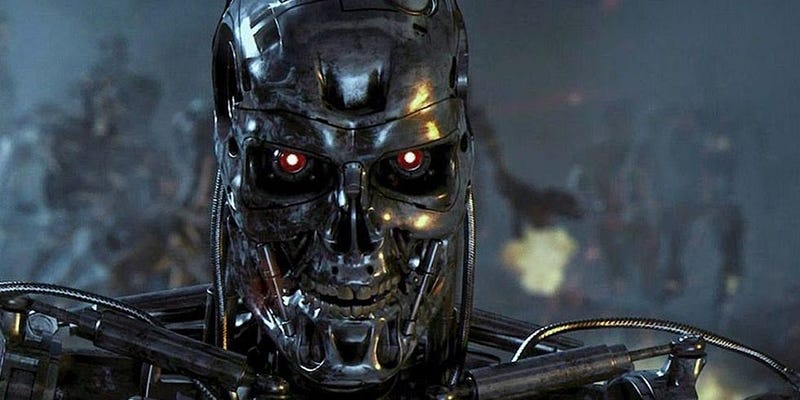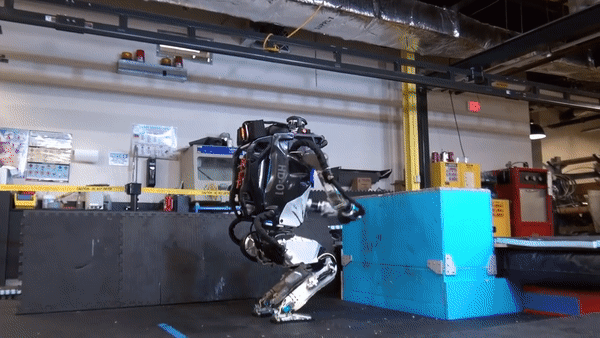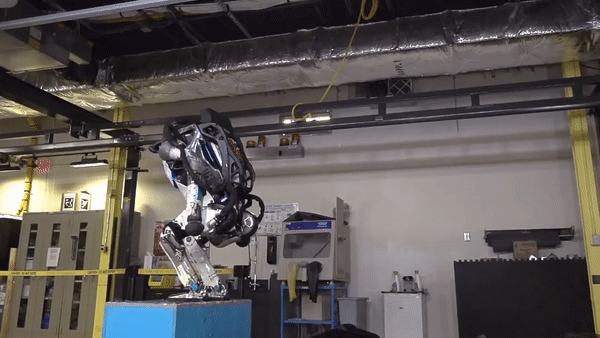Why Robotic and AI must be discussed considering public policies?
This text was adapted from my presentation for TEDxUNESPBauru 2018.
Hello, my name is Matthew and first of all I am a man, white, straight, cis and I grew up in a Catholic family and middle / upper class. And why does it matter?
The privilege that I have and that I will carry for the rest of my life is the main reason for having the conditions to talk about this subject and my main fuel to tread a path of social transformation around the world, to give back to society all the which I was able to receive.
And it's these words "Social Transformation" that may be my best heritage ...
But this is not a text to talk about my privileges, nor discuss equality of opportunity, gender, sexual, etc. I believe there are people far more capable than myself to accomplish this task.
So before going to the central theme I'll introduce myself better.
I am the son of strugglers, by definition merchants, but to my luck, dreamers.
In this context I was not hungry, I was not in misery, I did not have to work since I was 8 and I did not suffer the high psychological damages imposed by a macho and oppressive culture, this was the greatest gift I received from my parents, not to go through them obstacles that they.
All this care and care, put me in a position where I did not know my identity. The sacrifices that my parents spent distanced me from my roots and I grew up without a social or personal identity, I ended up growing apart from the rest of my family. When I started to go my own way, I decided to seek this identity in the most diverse places.
At the age of 17 I came to Bauru to attend the Faculty of Computer Science and to pursue a dream that I have nourished since childhood. The one about working with robotics. Thanks to Maurício de Souza, I loved Franjinha's stories and the idea of doing science.
It was with this motivation that I was part of the robot soccer team of the Unesp of Bauru and in 2013 I disputed my first championship, being Brazilian runner-up of one of the categories. It was a very good period where I got quite involved with robotics including education and I was part of interesting projects involving educational robotics.
And this desire to work with education is also part of my search for identity, in this case, social identity. I was a volunteer in several places and one of them, the Formiguinha Project, I was a social educator for 5 years and in 2 of them President of the institution. It was a very complicated period, where I had to reconcile college and volunteer work, I learned that transforming the reality of others is not an easy task. But very rewarding. It does not take much to impact people in their day to day life and carry with them good memories.
And that's why I feel so motivated to come and talk to you about a subject that has become my professional ideal: advanced technology and its social role,**let's focus on artificial intelligence, robotics and its social impact.**How society sees this issue and why it is a major topic to be discussed
**First I want to demystify the popular idea of robotics.**When we think of the robot the first image that comes to mind is a metallic, humanoid thing full of wires and exposed circuits that came from the future to kill you.
When in fact a robot can have much simpler forms and much more human functions, such as being an educational tool.
Even with these examples present in our day-to-day. A lot of people still think that the end of humanity will happen with a robot showing up tumbling and ready to kill
At least not yet!
Robots have a variety of forms, which are not necessarily physical, and they are in our lives much longer than we think, a robot is a word and a Swedish word meaning forced labor, and it is a term that gained strength in the 1930s with the boom of science fiction, mainly through the works of Izaac Asimov, but long before it was spoken of the automata and the human being always looked for ways to facilitate the heavy and monotonous (and almost always warlike) work.
In my experiences with the area of education, when we brought up the discussion of the use of technology in favor of education, the greatest fear of educators is that of technology replacing it. And that is a common thought, today this fear happens in many areas and more and more people are afraid of being replaced by machines.
According to [McKinsey's study](https://www1.folha.uol.com.br/mercado/2017/05/1884633-50-do-work-no-brasil-can-be-because-by- rob-say-study.shtml), 50% of jobs in Brazil could be automated and by 2030 it is estimated that approximately 18 million people will be impacted by automation. It's a scary number.
And to understand this we can use society's most important tool: the story.
Most of the social functions and jobs existing today are reflections of the first industrial revolution, although the main peculiarity of this revolution was the substitution of the artisan work by the salaried one and with the use of the machines. Even education has a history of creating repeaters of instructions, preparing for the factory floor.
The consequence of this is that today we live a reality where everything we consume can be produced by robots.
Even with the industrial revolution, there are still repetitive, difficult and unhealthy jobs. We are currently experiencing the replacement of these works and this is happening through the advances of Artificial Intelligence.
The whole world is going through a revolution at the hands of artificial Intelligence that has recently been dubbed ["the possible immortal dictator"](https://www.cnbc.com/2018/04/06/elon-musk-warns-ai- could-create-immortal-dictator-in-documentary.html) and that has gained space in hollywood works and in fiction in general (mainly black mirror). But first of all AI is a field of study of the cognitive sciences that consists of trying to reproduce human intelligence through software.
Today there are extremely smart applications and the market is shaping around AI
But we are far from reproducing human intelligence. We conquered many spaces unveiled well-defined mathematical models of our society, but we still have much to walk around. Even so the success rates are very good. Enough for companies in this segment to be market leaders and get growth with each passing year, because the AI works with information and today information is the largest market asset.
We are living an age of information and the volume of data has been increasing
We have come to the point where it has become inhumane to understand and manipulate this data and we have not been able to suggest solutions to complex problems such as financial crises, wealth distribution and ethnic conflicts. And it is in this context that AI and robotics should be employed, and therefore they should be openly debated as public policies, not only developed around optimization of profits or war industry (especially this), which is being debated by great minds , such as Elon Musk, Stephen Hawkins and Bill Gates and feared by the general public.
The main concern with this subject is that a machine serves the purpose for which it was sent and by which it was created.
And in this sense 2 things grow in parallel: the technology and the wisdom in using it.
And we have advanced so much in technology that today AI and robotics are like guns in a baby's hand.
How can we act to avoid this situation?
Izaac Asimov created in his book "I, Robot" three fundamental laws for the use of robotics to be for the benefit of mankind
1st Law: A robot can not hurt a human being or, by inaction, allow a human being to suffer some evil.
2nd Law: A robot must obey orders given to it by humans except in cases where such orders conflict with the First Law.
3rd Law: A robot must protect its own existence as long as such protection does not conflict with the First or Second Laws.
Because if you stop to think about it, the three Robotics Rules are the essential principles that guide many of the world's ethical systems. Certainly, every human being must have the instinct of self-preservation. This is Rule Three for a robot. Every "good" human being with a social conscience and a sense of responsibility must also submit to an appropriate authority; listen to your doctor, your boss, the government, your psychiatrist, your fellow man; obey the laws, follow rules, adapt to customs .... even when it interferes with your comfort or safety. This is Rule Two for a robot. Every "good" human being must also love his neighbor as himself, protect his fellow man, risk his life to save that of another. This is Rule One for a robot. To explain in a simple way: if a robot follows all the Rules of Robotics proposed by Isaac Asimov, it may be that he is a robot, and he may be just a very kind man.
The way we use robotics and artificial intelligence will depend on you.
There are still many unanswered questions and a long way to go, yet robotics and technology have proven to be the most feasible tool for achieving social equality without losing essential functions for modern civilization.
A very controversial and very common discussion I hear from time to time about social equity is the question of the "merit" of the professions and because one is better than the other, the example is usually given in the comparison between the garbage collector and the doctor.
For if there were social equality, and in this economic case, no one would want to go through all the medical student's effort to become a doctor, everyone would want to be a garbage collector. That's the softest argument I hear. And it is through it that I like to demonstrate the size of the social impact that technology will have on our lives, because in the future your garbage collector and your doctor will be robots. After all, the garbage collection work is inhuman, nonetheless essential to society, and medicine today is already a known mathematical model, people go to the operating table knowing the rate of success. And the robot will have a hit rate higher than the short human being. The project IBM Watson is focusing on the use of AI for medicine and is betting on an increase in the accuracy of diagnoses and treatments in the near future.
And we are not far from that reality, in that year 2018 the [FDA approved the use of Artificial Intelligence](https://www.technologyreview.com/the-download/610853/fda-approves-first-ai-powered-diagnostic -that-doesnt-need-a-doctors-help /) for diagnosis without the need for a doctor. The software is designed to detect more than a mild level of diabetic retinopathy, which causes vision loss and affects 30 million people in the United States. It occurs when high blood sugar damages the blood vessels of the retina.
And because of this we have to bring several other themes to evolve along with robotics, because today it is, as well as all advanced technology that was created by humanity, reality and ownership only of a small group of people, only those who can finance.
So when talking about robotics, we also have to talk about human rights, we have to talk about class struggle, we have to talk about gender equality, we have to talk about equal opportunities, etc.
Because technology is coming to occupy everything that the human being does that a machine should be doing, we need to make sure it does it fairly.
That way I hope that for us, after having all these tedious tasks performed automatically, about time for art, music, human relations, finally, about time to be more human.



